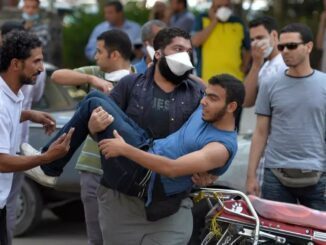
Amnesty International calls upon authorities to allow family visits as well as regular contacts with lawyers to all detainees in Sisi’s prisons
Amnesty has called on the coup authorities in Egypt to allow all detainees – including human rights defenders, political activists and other critics – to receive family visits and to be allowed regular contact with their loved ones and lawyers, including through phone calls.
On August 15, the Interior Ministry in Sisi’s government announced that prisons would resume their family visits on August 22, after a five-month suspension due to “the International Cooperation Organization on 19”, but Amnesty International is concerned that individuals detained in politically motivated cases are at risk of exclusion.
The coup government’s Interior Ministry published the phone numbers of 44 prisons across Egypt, but did not release some of the most well-known Egyptian prisons, including Tora Toughened Prison (known as Scorpion) and Tora High Security II, both of which are part of the Tora prison complex. Human rights defenders, political activists and other dissidents are being held on bogus terrorism charges.
Relatives of individuals held in these two prisons told Amnesty International that when they contacted the prison sector of the Ministry of Interior after the announcement or went to the Tora prison complex, officials claimed that they were not aware of any orders to resume family visits in Tora Maximum Security in Prisons 1 and 2.
The organization said, “The decision to resume visits provides some relief to family members who have lived in a state of distress for several months with little or no information about the health and well-being of their loved ones. Their fears have been exacerbated by reports that Egyptian prisons are known to be overcrowded and unsanitary in Egyptian prisons, amid a blackout.” For information. “
The organization expressed its fear that some detainees facing unfounded “terrorist” charges, including human rights defenders, journalists and political activists, may be excluded from prison visits. The organization said: “Our concerns stem from the authorities’ history of depriving dozens of individuals detained in cases “Politically motivated, including family visits and other contacts with the outside world for periods of up to months or years, even before the outbreak of the epidemic. The authorities must abide by their domestic and international obligations to ensure the rights of prisoners to communicate with the outside world.”
The organization added that the coup authorities’ refusal of family visits and other contacts with the outside world was due to the “Covid-19” crisis. For years, authorities have prevented scores of detainees, including political opponents, critics, and human rights lawyers, from contacting family members or lawyers. For example, Hoda Abdel Moneim, a 61-year-old human rights lawyer who was arbitrarily detained in Qanater Women’s Prison, has not been allowed one visit since her arrest on November 1, 2018, according to her family. The authorities appear to be imposing discriminatory restrictions with the aim of punishing detainees because of their political beliefs or because of the peaceful exercise of their rights.
After the authorities suspended family visits in March 2020, prison administrations also prevented some people held in political cases from exchanging messages with their family members.
The coup authorities have yet to comply with prison regulations requiring biweekly phone calls to detainees. The lack of phone contact particularly affects detainees from poor backgrounds or those held in prisons far from their homes, whose relatives cannot afford the long and expensive journeys.
The organization continued, “We call on the Egyptian authorities to ensure that all detainees are allowed to contact their loved ones through free phone calls. They must also ensure that all detainees, regardless of the charges against them, are able to receive regular visits from their loved ones without discrimination.”
The resumed visits will also be subject to a number of restrictions. Visits must be booked in advance, and each detainee will be allowed one visit of 20 minutes per month.
While the authorities claim that restricting family visits are necessary measures to protect public health, they have shown reluctance to take measures to reduce overcrowding, especially with regard to detainees held in politically motivated cases.
Amnesty International renewed its call on the coup government to immediately and unconditionally release all activists and human rights defenders detained solely for exercising their rights to freedom of expression, association and peaceful assembly. It should also consider the release of children, pretrial detainees, and detainees at particular risk of contracting the disease, including those who are older or have underlying medical conditions, as a way to reduce the prison population and prevent harm. It should also consider adopting non-custodial measures for persons accused of non-violent crimes.
The announcement of the resumption of family visits comes a few days after the death of Essam El-Erian, deputy head of the Freedom and Justice Party, linked to the Muslim Brotherhood, while in detention on August 13, 2020. Since the visits were suspended in March 2020, prison authorities in Mazraa Ward Prison in Tora have not allowed individuals to His family called him by phone or exchanged letters.
While the coup authorities said that they had taken effective measures to reduce the spread of “Covid-19” in places of detention, human rights organizations reported the death of detainees and employees in prisons and police stations due to complications suspected of being complications of “Covid-19”.
The information blackout resulting from the suspension of family visits, the crackdown on any critical reports about the government’s handling of the health crisis, and the practice of prison administrations to censor messages containing information on “Covid-19” in prisons have caused great concern to relatives who have remained in prison. Darkness about the health and well-being of loved ones amid an epidemic.



